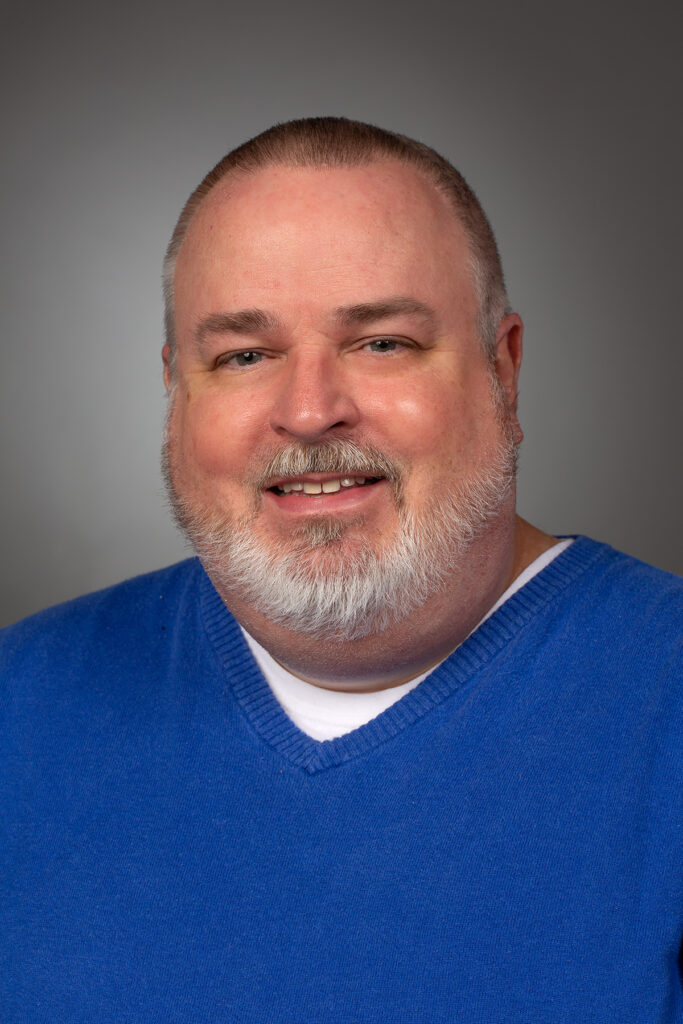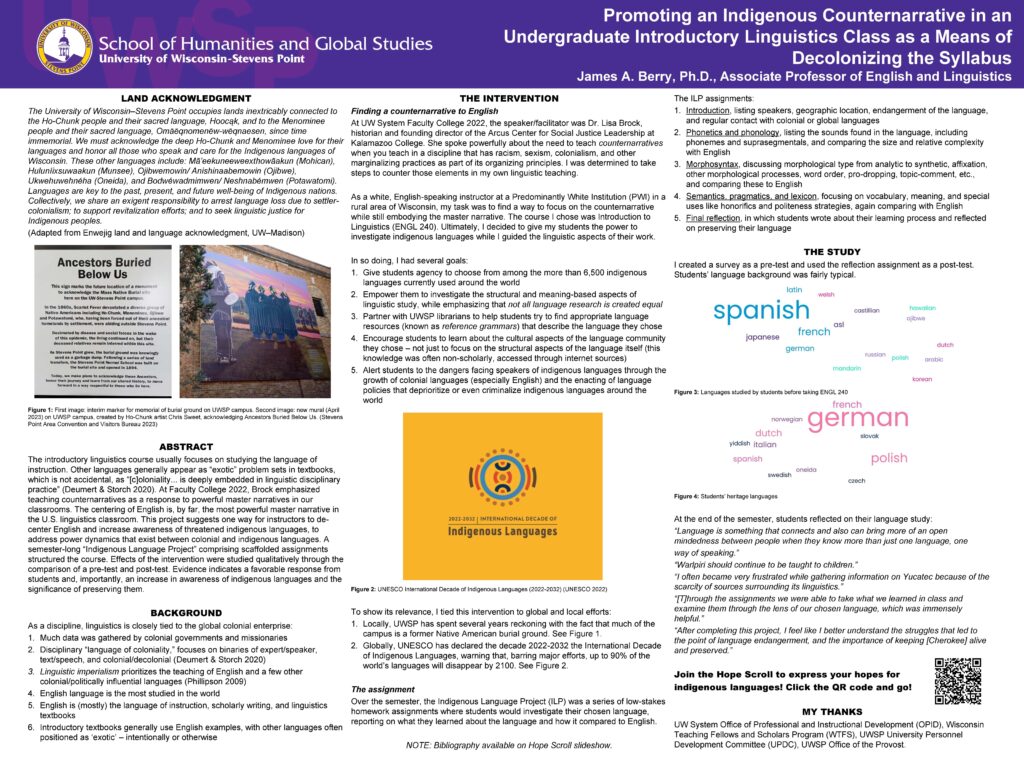University of Wisconsin-Stevens Point
Associate Professor of English
Wisconsin Teaching Scholar, 2022-23
As of this writing, I am about two and a half years out from Faculty College 2022, which is when my SoTL journey began with OPID and the Universities of Wisconsin. I participated in WTFS in 2022-23. Our events (Faculty College, Summer Institute, Winter Institute, and the OPID Spring Conference) were centered on equity-based SoTL, and our theme was based on the counternarrative, thanks to a presentation at Faculty College by Dr. Lisa Brock. That was a transformative year for me and my academic life, and those transformations are ongoing.
At the time, I was a relatively well-adjusted faculty member, teaching linguistics in my English department at UWSP, recently tenured, and looking to expand my knowledge, skills, and reach. At a social event, I was approached by my history colleague Valerie Barske, who was a co-director of the WTFS program. She thought I might be a good candidate for WTFS, and I decided to apply for the 2022-23 cohort.
Until that point, I had essentially no awareness of OPID, WTFS, or SoTL. Even our teaching center at UWSP, CITL, was only slightly known to me. My year in WTFS exposed me to all of the communities and resources available for my teaching and learning experiences. The Faculty College and Summer Institute sessions were welcoming, enthusiastic, and enlightening. I absorbed a lot of content in those two weeks and felt the joy of learning that I had felt when first discovering linguistics. For me, the best learning experiences pair intellectual stimulation with emotional fulfillment, and I found both of these in May-June 2022.
My WTFS project, based on a fairly large-scale intervention in my Introduction to Linguistics class, occupied my summer and fall. I planned and carried out an instructional shift, introducing a semester-long project that involved students choosing an indigenous language and investigating it in parallel to our classroom discussions. Turning that intervention into a poster presentation was the focus of my winter and spring, and presenting my work at the OPID Spring Conference in April 2023 was an exciting conclusion to a fantastic experience—or so I initially thought.
My exposure to SoTL through WTFS has changed my academic life since that time, however. The first mark has been on my scholarship. In March 2024, I was able to convert my WTFS poster to a 45-minute presentation that I took to the SoTL Commons conference in Savannah, Georgia. It was well received, which was an exciting experience for me. After that presentation, I was invited to expand my work again and present it as a 90-minute workshop for the WTFS Summer Institute in June 2024. When I was at SoTL Commons, I met Melanie Hamilton, the current ISSOTL president, and she urged me to apply for the ISSOTL conference in French Lick, Indiana—where I presented my 90-minute workshop in October 2024 for a new audience.
The welcome I have received as a new scholar of SoTL has encouraged me to expand my reach, and I have found new avenues, for example in the Scholarly Teaching Special Interest Group of my disciplinary organization, the Linguistic Society of America. In the past several years, the attention to SoTL among linguists has grown significantly. A group of scholars associated with the Scholarly Teaching SIG received a grant to create and pilot an assignment and activity bank accessible to all LSA members, and I participated in the workshop associated with that assignment bank in July-August 2024. In January 2025, I have been invited to present my assignment and workshop experience in an organized session at the LSA annual meeting. I have also been an active participant in UWSP’s teaching and learning conferences since my WTFS year.
As seems to be typical among SoTL scholars, the growth in my scholarship has been accompanied by a related growth in my service. During the year that I participated in WTFS, the acting director of our Center for Inclusive Teaching and Learning, Erin Speetzen, was hired as the director. As a result, her faculty position on the OPID Advisory Council became vacant, and I was invited to take that role. I have been the faculty member from UWSP since January 2023. At the OPID Advisory Council meetings, I have been able to connect with faculty and center directors from across the Universities of Wisconsin community, learning about SoTL and other scholarly teaching initiatives as well as building friendships. I have been able to share my experiences and learn from colleagues. As a member, I was able to review presentation proposals for the most recent Spring Conference on Teaching and Learning, and I am learning about SoTL from a variety of perspectives.
My teaching, of course, has grown in many ways since my exposure to SoTL. Not only have I changed several assignments and teaching strategies in my Introduction to Linguistics course, but I have also added smaller interventions in both my linguistics and my composition courses. I have always sought to improve my teaching in ways both large and small, but SoTL helps to give me a framework for those improvements. These days, I am exploring ungrading practices, considering the role that AI can play in teaching and learning, and always expanding access for students from a number of backgrounds. I have moved away from a focus purely on content toward a focus that includes understanding and using skills and tools. All of these shifts had already been part of what I wanted in my classes, but the unifying nature of SoTL has helped me give my work a name and a story.
These have been, as I mentioned above, transformative experiences in my academic career. I feel as though I never truly understood myself as an educator until I entered the SoTL and scholarly teaching communities—until I found “my people.” I hope to continue to find new directions and new projects and new ways to connect with colleagues and students and mentors in the future. I believe SoTL will always play a significant role in my “life of the mind” going forward.
Biography:
James Berry is an associate professor of English, specializing in linguistics, at the University of Wisconsin–Stevens Point. He earned his BA in English at the University of Florida, and his MA and PhD in English Linguistics at Arizona State University, where his academic interests included generative syntax, language change, sociolinguistics, pragmatics, and language contact. His research has focused on the historical intersection of syntax and pragmatics, in English, Mandarin, and other languages, that enables the development of speech-act, evaluative, evidential, and epistemic adverbs. In addition, he has published on linguistics pedagogy, focusing on the use of an Invented Languages class to teach advanced introductory linguistics. Dr. Berry currently focuses his pedagogical research on the sociolinguistics of academia, particularly language and power; his recent work in SoTL seeks to decolonize the classroom.
SoTL Presentations, Workshops, and Invited Talks:
October 2024 “Using an equity-minded SoTL approach in an introductory linguistics classroom, and taking that approach on the road” (workshop), ISSOTL 2024, International Society for the Scholarship of Teaching and Learning French Lick, IN
July-August 2024 2024 Workshop on Scholarly Teaching and SoTL in Linguistics (WoSTaSiL 2024), Linguistic Society of America–Scholarly Teaching in Linguistics Special Interest, Group, Online, 5 weeks
- Developed assignment and narrative for piloting in Teaching Resources and Innovations Library for Linguistics (TRILL)
- Reviewed assignments and narratives from fellow participants
https://sites.google.com/boisestate.edu/wostasil-2024/home
June 2024 “Efforts to decolonize the linguistics classroom: An equity-based SoTL approach centered on counternarratives”, Wisconsin Teaching Fellows and Scholars Summer Institute, University of Wisconsin–Madison, Madison, WI
February 2024 “Equity-minded SoTL and decolonizing the introductory linguistics classroom: Introducing a counternarrative focused on indigenous languages”, SoTL Commons Conference 2024, Georgia Southern University, Savannah, GA
April 2023 “Promoting an Indigenous counternarrative in an undergraduate introductory linguistics class” (poster presentation), UW System Office of Professional and Instructional Development (OPID), Annual OPID Spring Teaching Conference, University of Wisconsin–Madison, University of Wisconsin–Madison, Madison, WI
January 2023 Keynote panel: “Practicing hope: Instructor burnout as a social justice issue”, 27th Annual Teaching Conference, University of Wisconsin–Stevens Point, UWSP, Stevens Point, WI
January 2023 Co-chair, roundtable (with Dr. Saemyi Park and Dr. Laura Anderson-McIntyre): “Decolonizing the classroom: Building equity and diversity into course content”, 27th Annual Teaching Conference, University of Wisconsin–Stevens Point, UWSP, Stevens Point, WI
OPID Faculty College cohorts: 2022 (WTFS), 2023, 2024
Professional Organizations:
Linguistic Society of America, Scholarly Teaching in Linguistics Special Interest Group
International Society for the Scholarship of Teaching and Learning (ISSOTL)
OPID Advisory Council

